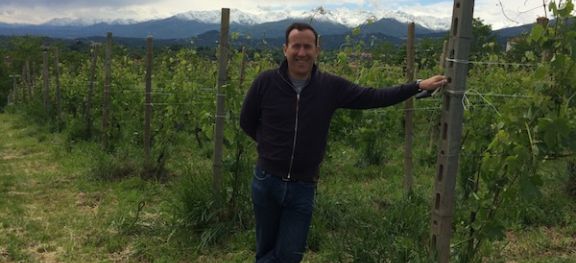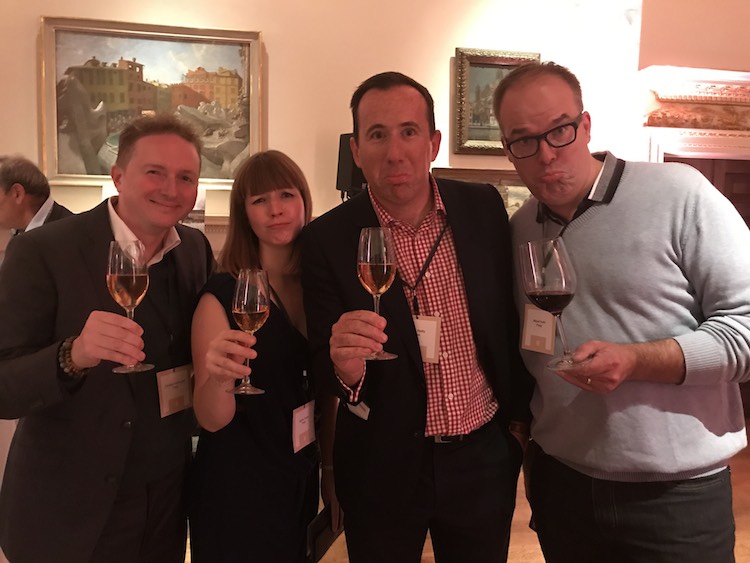From retsina to the Roederers


Tuesday evening Our Richard fought off strong competition (including one Ms Harding MW) to win the online category for his Spittoon columns. The latest one will be published tomorrow. Below is a picture entitled Losers taken at tonight's Roederer awards and sent by Simon Reilly, third from the left.

Tuesday morning Simon Reilly, pictured above right in Tenute Sella's vineyard in Lessona, charts his progress as a part-time wine writer. We wish him and our other contributors shortlisted in tonight's Louis Roederer awards (Julia, Richard, Sophie Thorpe and Simon Woolf who were both shortlisted in our wine writing competition last year and photographer Jon Wyand) every success.
Retsina
It all started in the summer of 2015, standing by a barbecue in Turkey, poking kebabs around the grill, sipping Efes and talking to my mate Mark about his food magazine, Root + Bone. ‘We haven't really done anything about wine. Why don't you write something?’ said Mark.
So I pitched an idea about the ancient Greek wine retsina. The theme of the next issue was education, so I figured this would loosely fit into a history lesson. It was published and I managed to score some free wine samples along the way. This was pretty cool, I thought. I'll write some more.
I have always loved wine, bought a lot of wine, visited wine regions, read about wine studiously but I had never considered wine writing before. But now I had been published I caught the bug. I wanted to do this again. I decided to set up a blog. I bought a domain name, came up with a name with wine in the title and a word from my local Doric dialect meaning ‘boy’ and wineloon was born. I started writing as much as I could with a day job and family to juggle.
As well as the blog, I quickly realised that a social media presence was required, so I set up Twitter, Instagram and Facebook accounts. My followers were limited to close friends and family until one night, soon after publishing one of my first blogs about a trip to The Sampler in Islington, my Twitter followers leapt from about 12 to something in the 40s: the direct result of a tweet by a wine writer called Matt Walls, whom I had never met. It simply said, ‘this guy's worth a follow’, and seemingly about 30-odd people did. This really spurred me on and made me want to write more.
This was the first of many examples I have experienced of random acts of kindness from the wine world. Peter McCombie (a MW and chair of the IWC) is another person who has helped me along the way. It was he who got me invited on my first press trip, to Alto Piemonte. To be clear, the chance of getting invited on a press trip is reason itself to start writing. Whisked around wineries meeting winemakers, eating great food and tasting lots of interesting wines with other wine geeks like yourself – attending your first press trip is living the dream.
The breakthrough
My big break came on these pages however. In January 2016, I started writing what was intended to be my second article for Root + Bone about three Australian winemakers making wine in Burgundy (Andrew Nielsen, Mark Haisma and Jane Eyre). As I interviewed them, it became clear that there was an interesting angle here about the rising costs of Burgundy fruit forcing them to move to cheaper areas like Beaujolais. The article became too in-depth for the food magazine, so I decided to take a punt and send it to some specialist wine publications to see if there was any interest in publishing.
I couldn't work out Jancis's email address from the website, so instead I crudely cut and pasted the entire article into the Contact box on this site. I got an email the next day from Tamlyn suggesting an email was a more user-friendly approach. She said she'd pass it to Jancis, ‘but she is in Australia so you probably won't hear from her for a month or two’. This sounded like a slow no to me so I didn't hold much hope of hearing back.
Later that day I received an email from Julia with several very detailed questions about the article. I responded as thoroughly as I could since it slowly dawned on me that she was editing my article. I felt like an excited schoolboy. Once I had answered all the queries, the following day on the train to work I finally plucked up the courage to ask what happened next... 'it will be published in due course’ was Julia's simple reply.
My head almost burst with excitement and I raced up the two flights of stairs at Highbury & Islington station in three leaps. I managed to stop myself from doing a celebratory knee slide across the station concourse, but only just. The days following the publication of the article saw my Twitter followers jump up to the heady heights of eighty-something.
Brexit
I continued to write blogs regularly on Wineloon and sent Jancis an article or two when I thought I had a decent angle and she published a few more, much to my delight. Then came the game changer. And funnily enough, it came as a result of some daydreaming at work. It must have been February or March 2016. Boris Johnson had just had just pledged his allegiance to the Leave [EU] campaign in the run up to the Brexit referendum. The pound plummeted against the euro as a result.
Unfortunately, I was working for a train company at the time and had just bought a lot of new trains from a Spanish manufacturer in euros. I was sitting on a big euro exposure so was in the process of meeting with the banks to work out how best to manage this risk. As often happens when a banker starts talking, my mind started to drift, and inevitably I started thinking about wine. This led me to write an article about what life might be like for wine lovers if we voted to leave the EU.
In March 2016, Brexit was commonly viewed as a highly unlikely scenario, so at the time the article felt a little fanciful. Three months later, this article felt very real indeed. Jancis re-published it the day after the referendum and it went on to become the third most read article on Purple Pages that year. That is a statistic I am very proud of.
The day after the referendum was a whirlwind. On top of the emotions everyone was feeling due to the surprise result, I was busy fielding emails and calls from all angles as I seemed to be one of a few people who had written about Brexit and wine before the referendum. I even got a call from the BBC, which was very surreal and they referenced me in one of their online articles, much to my delight.
The Brexit ordeal seemed to get my name out into the wine trade, as I started getting lots of invites to trade tastings, events and more press trips (yippee!). I have a full-time job so I ended up doing most of my wine tastings during my lunch hour.
Monkey tennis
It was at this time that I was asked to pitch an article to Decanter magazine. This was new to me. Up to this point I had just either published articles on my own website or sent them to Jancis who either published them or not. What followed was a frankly embarrassing episode with me unsuccessfully pitching increasingly ridiculous and convoluted story ideas. It was like Alan Partridge pitching to Tony Hares; youth hostelling with Chris Eubank or monkey tennis anyone?
I had been asked to write in their annual Italy guide, so I started with Alto Piemonte, where I had recently visited and tasted lots of great wines. That was declined, and I then proceeded to pitch unsuccessful idea after unsuccessful idea until I eventually ran out of steam. By the end, it was practically two-word emails, one of which was generally ‘wines’ as in island wines, mountain wines, volcanic wines, pink wines, orange wines, indigenous wines, non-indigenous wines. I think they felt sorry for me, possibly admiring my ability to accept rejection, and suggested I write about alpine wines.
I then spent the next month or so drinking through about 50-odd samples of alpine wines kindly sent to me by merchants and importers and tasting many more at tastings. As a result, my wife now hates alpine wines.
The Roederers
Some time last year I saw an advert for a wine-writing competition on social media so I though I’d give it a whirl. To my surprise they chose an article I’d written entitled ‘Is terroir bollocks?’ to be shortlisted for one of the awards. I didn’t win the competition but I thought that if I can get shortlisted with an article with bollocks in the title then if I enter something less offensive I might end up winning one.
This led me to enter the Louis Roederer International Wine Writers’ Awards (commonly referred to as ‘the Roederers’), which claims to be the Oscars of the wine-writing world. I entered two articles I’d written for Jancis and the alpine wines article in hope rather than expectation. However, much to my surprise (and delight, obviously), I have been shortlisted in the ‘emerging wine writer’ category. So tonight I shall be attending the awards party at the Royal Academy to drink lots of champagne, eat lots of canapés and hear the results.
But I don’t write to enter competitions, and I certainly don’t it for the money. I do it because I love wine and enjoy learning more about it. However, it is the experience of meeting like-minded people in the wine world through my writing that has been the most rewarding. The joy I have had from tasting weird and wonderful wines and meeting kind, generous and interesting people is something that money just can't buy.
So, whether I win tonight or not is irrelevant. I will attend the swanky do, drink lots of champagne and speak to as many people as I can. I've had a blast over the last two years and I intend to keep writing as long as I am able to pick up a glass. Cheers!
Become a member to view this article and thousands more!
- 15,396 featured articles
- 274,621 wine reviews
- Maps from The World Atlas of Wine, 8th edition (RRP £50)
- The Oxford Companion to Wine, 5th edition (RRP £50)
- Members’ forum
- 15,396 featured articles
- 274,621 wine reviews
- Maps from The World Atlas of Wine, 8th edition (RRP £50)
- The Oxford Companion to Wine, 5th edition (RRP £50)
- Members’ forum
- Commercial use of our Tasting Notes